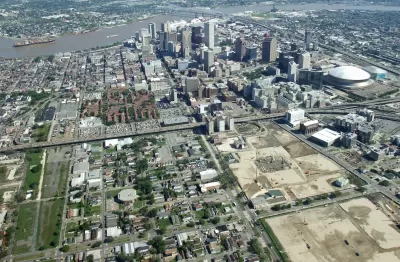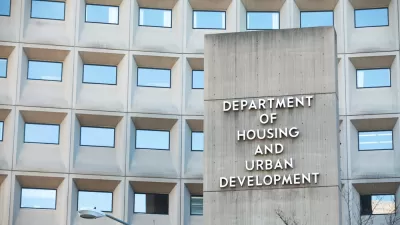In the aftermath of Katrina, President Obama's Choice Neighborhoods initiative promised thousands of new affordable units. But so far the Housing Authority of New Orleans hasn't proved up to the task.

In an article for Next City, Katy Reckdahl tells the halting story of New Orleans public housing after the flood. Following an extended period of inaction, four years ago "a trapezoid-shaped, 300-square-block section of the city [was] targeted for a major federal 'transformation' through the Choice Neighborhoods initiative heralded as a keystone of President Barack Obama's urban agenda."
"Yet the federal government also may have over-estimated its signature initiative, which awarded its first high-profile Choice Neighborhood grants to five cities in 2011 but was only able to give them a combined $122 million [...] If construction continues at the same pace in coming years, the promised 2,314 apartments won't be complete until 2026."
The relative scantiness of Choice Neighborhoods funding slows results. "'$350 million, spread over the U.S. for distressed neighborhoods is a drop in the bucket,' said Anthony Sanders, a professor of finance at George Mason University."
In addition, infrastructural inadequacies make it difficult to secure the investment necessary to fully finance the projects. Reckdahl writes, "New developments usually became islands of shiny, colorful buildings stuck in still-troubled neighborhoods with sporadic bus service, poor schools and little green space."
Meanwhile, the Housing Authority of New Orleans (HANO) has been hesitant to make its records public. "A broader context was impossible to get from HANO, since its staff refused to turn over the progress reports that HUD requires it send each quarter."
FULL STORY: 10 Years After Katrina, New Orleans Public Housing Still in Limbo

Planetizen Federal Action Tracker
A weekly monitor of how Trump’s orders and actions are impacting planners and planning in America.

Maui's Vacation Rental Debate Turns Ugly
Verbal attacks, misinformation campaigns and fistfights plague a high-stakes debate to convert thousands of vacation rentals into long-term housing.

San Francisco Suspends Traffic Calming Amidst Record Deaths
Citing “a challenging fiscal landscape,” the city will cease the program on the heels of 42 traffic deaths, including 24 pedestrians.

Defunct Pittsburgh Power Plant to Become Residential Tower
A decommissioned steam heat plant will be redeveloped into almost 100 affordable housing units.

Trump Prompts Restructuring of Transportation Research Board in “Unprecedented Overreach”
The TRB has eliminated more than half of its committees including those focused on climate, equity, and cities.

Amtrak Rolls Out New Orleans to Alabama “Mardi Gras” Train
The new service will operate morning and evening departures between Mobile and New Orleans.
Urban Design for Planners 1: Software Tools
This six-course series explores essential urban design concepts using open source software and equips planners with the tools they need to participate fully in the urban design process.
Planning for Universal Design
Learn the tools for implementing Universal Design in planning regulations.
Heyer Gruel & Associates PA
JM Goldson LLC
Custer County Colorado
City of Camden Redevelopment Agency
City of Astoria
Transportation Research & Education Center (TREC) at Portland State University
Jefferson Parish Government
Camden Redevelopment Agency
City of Claremont




























